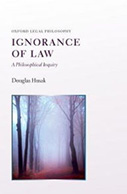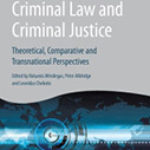Ignorance Of Law: A Philosophical Inquiry

Author: Douglas Husak
Publisher: Oxford, UK; New York: Oxford University Press, 2016. 320p.
Reviewer: Stephen Bero | March 2017
A staple of the first-year criminal law course required of every law student is the venerable adage ignorantia juris non excusat—ignorance of law does not excuse. And a staple of scholarship on this topic is that this adage proves, in a perhaps surprising number of cases, to be false. Ignorance of law is a defense to criminal liability in a variety of situations, and while these may not be the norm they are also not merely anomalous or deviant—it is often appropriate to treat ignorance of law as an excuse. This presents the question: When should ignorance of law excuse?
Douglas Husak’s Ignorance of Law considers a radical and provocative answer: Always. That is, quite generally, “the mens rea of a criminal offense should be construed to require not only knowledge of the relevant facts but also knowledge of the applicable law” (p. 2). This position is subject to certain qualifications; ultimately, Husak settles on the view that ignorance of law is nearly always at least a partial excuse. And Husak is at pains to emphasize the various ways in which his view “is not nearly as revolutionary as appearances may suggest” (p. 13). Nonetheless, he urges a more or less complete repudiation of the venerable adage as it has traditionally been understood.
As we would expect from Husak’s distinguished body of work in criminal law theory, his case that ignorance of law should (nearly) always excuse is methodical, sophisticated, resourceful, and in many ways compelling. One of the book’s strengths is Husak’s use of recent work from moral philosophy on the significance of normative ignorance to illuminate questions about ignorance of law. Husak thus largely achieves his stated ambition of bridging the gap between philosophy and legal theory while retaining the best features of both.
I will first summarize the book, focusing on what I take to be the core argument, before briefly raising a few questions. The first two chapters deal with preliminary matters; chapter 1 lays out Husak’s methodology and background assumptions, and chapter 2 reviews the often confusing and contradictory state of both current legal doctrine and scholarly commentary on ignorance of law. Among other things, chapter 1 makes two points that set up the central argument of the book. First, Husak understands the basic question about ignorance of law to be the comparative question of how the appropriate degree of legal punishment differs between one person who acts in the knowledge that her conduct violates the law, and another, otherwise identical actor, who acts in ignorance of this. Second, Husak assumes that the appropriate degree of legal punishment is a function of the offender’s degree of moral responsibility or blameworthiness. This places Husak squarely within the retributive tradition, and it means that in order to answer his basic question about ignorance of law we need a theory of moral responsibility.
The heart of the book is thus chapter 3, in which Husak formulates his preferred conception of moral responsibility. He argues that we are fully responsible or blameworthy for misconduct only when, and because, we deliberately choose to disregard the moral reasons against acting in the way that we do. This means that when we mistakenly think that wrongful conduct is permissible, we are not responsible for the wrongdoing (our possible responsibility for the mistake itself being a separate question). Moreover, Husak argues that this basic point generalizes to cover not only mistakes of fact, but also mistakes about the contents of our moral obligations. (On this latter point, Husak acknowledges a large debt to influential recent work by the philosophers Michael Zimmerman and Gideon Rosen.)
To illustrate, Husak contrasts two characters, Juan and Carlos, who both flip a switch that detonates a bomb, killing innocent people. Imagine that Juan acts under the (reasonable) misapprehension that the switch is an ordinary light switch, while Carlos knows that the switch will set off a deadly bomb, but mistakenly believes that there is no moral reason not to kill innocent people. Because moral blameworthiness is a matter of deliberately disregarding moral reasons, Husak reasons that neither actor deserves any blame at all; even Carlos “is not morally blameworthy because the moral reason not to kill . . . could play no more of a role in his rational deliberation than the factual reason . . . could play for Juan” (p. 155).
Husak repeatedly acknowledges that this conception of moral responsibility is controversial and unlikely to persuade everyone. He is particularly concerned about a family of rival views that he calls “quality of will” theories, which hold an agent responsible not when she acts against her judgment of what morality requires, but rather when her action expresses an attitude or judgment that gives insufficient weight to moral reasons. According to such views, someone like Carlos is clearly culpable, since his judgment that killing innocents is permissible gives insufficient weight to the relevant moral reasons.
But Husak has a backup argument for those who subscribe to quality of will theories. Even if such theories do not let Carlos completely off the hook (in the way that Husak’s preferred theory does), it seems that such theories should still hold Carlos less culpable than an otherwise identical agent who flips the switch knowing that killing innocents is wrong. That is, even according to quality of will theories, ignorance of morality should be treated as an important partial excuse—contrary to the traditional understanding of ignorantia juris.
Husak is fully aware that his view has some uncomfortable implications. These are revealed most starkly in his discussion in chapter 4 of “ideologically driven zealots who erroneously believe they are justified to kill persons who oppose their political agenda”—a group he labels “terrorists” (p. 207). According to the theory, such terrorists are entitled to an ignorance excuse. This, Husak concedes, “constitutes the single most worrisome implication of a theory that affords some degree of exculpation to nearly all defendants who are ignorant of law,” and is likely to strike many readers as a “devastating reductio” of his view (p. 207). Confessing “enormous uncertainty” (p. 207) on this point, Husak tries out a trio of possible responses, including, as a last resort, proposing a system of preventative detention to protect the public from morally mistaken, and thus innocent, terrorists.
Chapter 4 also discusses four further issues raised by the arguments in chapter 3, including exactly what it means to say that an offender is “ignorant of law”; the circumstances under which we should recognize limited exceptions to the general principle that ignorance excuses (e.g., willful ignorance); the relevance of the distinction between mala in se and mala prohibita; and the question of culpability for negligent mistakes of law.
Finally, chapter 5 focuses primarily on practical questions. Husak first considers whether an ignorance of law defense should be incorporated into the law by making knowledge of the applicable law an element of the mens rea of each offense, or rather by creating a freestanding affirmative defense of ignorance of law. The second part of chapter 5 then turns to the advantages and disadvantages of implementing his proposal. Chief among the advantages that Husak claims is that “[a]part from implementing a better theory of criminalization—and repealing unjustifiable offenses such as drug proscriptions—I am unaware of a single reform defensible on grounds of justice that could be more effective in reducing the amount of punishment than the theory I have described here” (p. 272). Against this and other advantages, Husak weighs the disadvantage that his proposals could prove simply unacceptable to the voting public. Ultimately, he remains ambivalent about the practical upshot of his view; he concludes by emphasizing that his “central objective” has been “to describe the ideal to which I believe our systems of criminal justice should aspire” (p. 281).
But in addition to these practical points, chapter 5 also for the first time addresses a critical but hitherto neglected question: The arguments in chapter 3 suggest only that ignorance of morality excuses; so what does any of this have to do with ignorance of law? In response, Husak argues briefly that law serves an important settlement function, providing a “surrogate” (p. 258) for morality that relieves officials from the need to resolve controversial moral questions. He argues that while the “true normative basis of exculpation is ignorance of the morality underlying law,” nonetheless for “all practical purposes . . . law does all of the exculpatory and inculpatory work” (pp. 261-62). This point is indispensible to Husak’s central argument; it is thus a bit odd that it is not even addressed, let alone (somewhat cursorily) defended and developed, until so late in the book. It also raises a number of further unanswered questions about the connections between morality, law, and responsibility—for instance, how does this interact with Husak’s earlier suggestion that “terrorists,” who presumably know the law but are mistaken about morality, are entitled to a defense?
Throughout, Husak is admirably forthcoming about the potential vulnerabilities and disadvantages of his claims, and he repeatedly remarks that his controversial conception of moral responsibility is the “weakest link” (p. 146) and the “Achilles heel” (p. 271) of his project. But let me suggest another possible point of vulnerability that Husak does not directly address. Suppose that we are persuaded of Husak’s view of moral responsibility, but cannot stomach his conclusion that legal punishment should not be imposed on the morally mistaken terrorist. Perhaps unexpectedly, this combination of views could give us reason to question Husak’s retributivist assumptions.
Husak briefly considers and rejects retributivism’s traditional rival—deterrence theory—but he does not consider a third family of (loosely Rawlsian) views, which understand criminal punishment as an exercise of the political community’s entitlement to protect its members against violations of their rights through a fair system of reciprocal prohibitions. In such a system, characters like the mistaken terrorist who are (let us suppose) innocent with respect to the moral injunction against killing may still legitimately be subject to legal punishment because they satisfy conditions for the imposition of sanctions (e.g., they had an opportunity to comply with the law), according to a system of criminal justice to which they are fairly subject.
It is a further question whether, according to this sort of theory, ignorance of law should qualify as a defense. But it is interesting to note that if so, this could be a matter of recognizing ignorance of law itself as directly exculpatory, rather than treating ignorance of law, as Husak does, as a “surrogate” for ignorance of morality. And perhaps more significantly, this suggests that Husak’s arguments in favor of his preferred conception of moral responsibility may unintentionally strengthen the hand of certain critics of his retributivism. This is because proponents of the view that it is not, pace Husak, moral desert that determines the appropriate degree of punishment, but rather the terms of a fair system of reciprocal protections of basic rights, could use our intuitive aversion to letting the terrorist go unpunished as leverage against this aspect of Husak’s position.
These remarks are not primarily intended as criticism. They seek rather to illustrate a significant virtue of Husak’s book, which is that it illuminates the topic of ignorance of law in a way that clarifies a wide range of interesting theoretical connections and relationships.
In a book as theoretically ambitious and as densely argued as Ignorance of Law, it is inevitable that most readers will be able to find some significant point with which to disagree. But this should not detract from Husak’s accomplishment, which is to shift the focus of scholarly discussion of the ignorantia juris doctrine. Up to this point, it has been common to assume that this venerable adage captured an important truth, if only imperfectly. The challenge was only to say what that truth was. From now on, as Husak has shown, we might do better to start from the question of whether there is anything to the venerable adage at all.
Stephen Bero, PhD Candidate, Department of Philosophy, University of Southern California


